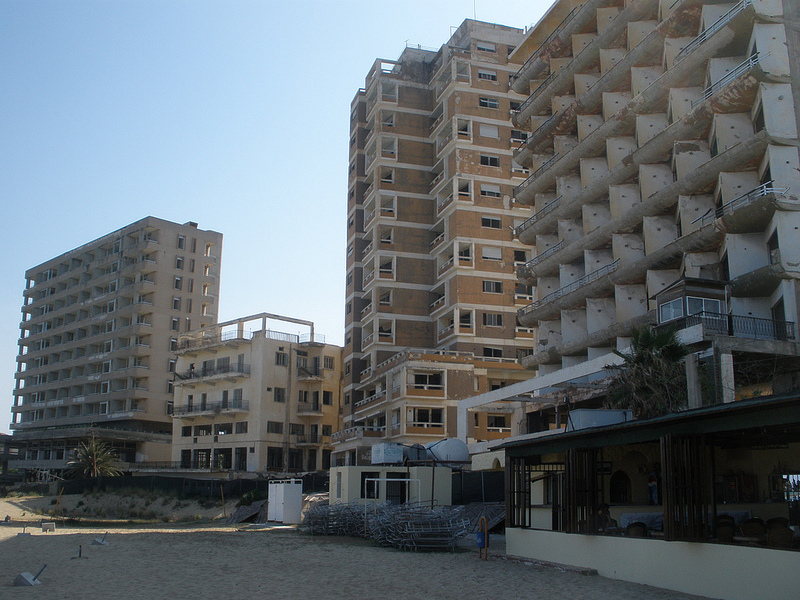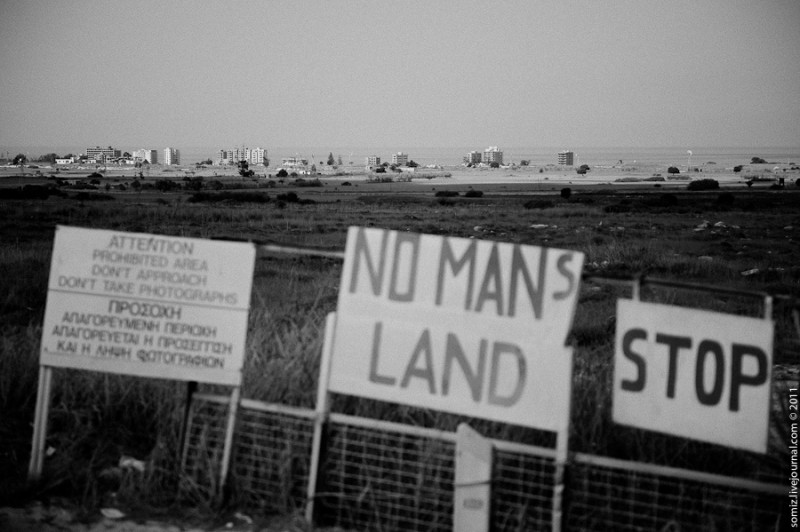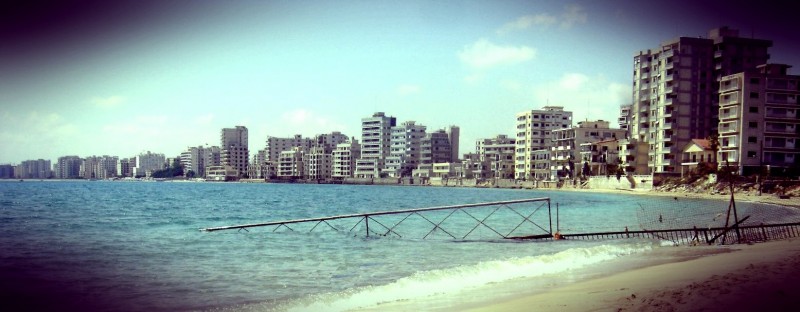Standing with my feet in the warm sands of the Palm Beach hotel in Famagusta, an eeriness washes over me. The beach is awash in tourists sunning under crisp linen parasols, seemingly unaware of the spectre looming over them. The vacant, crumbling windows of hundreds of the most exclusive hotels and villas in Cyprus shadow the popular, pristine beach, like eyes watching your every movement. This is the once illustrious city of Varosha, cordoned off under Turkish military rule and left to decay slowly, visibly behind huge barbed wire fences which fringe the sand.
Vagabondish is reader-supported. When you buy through links on our site, we may earn a small affiliate commission. Read our disclosure.
Ostensibly, Famagusta may seem like an unlikely place for a ghost town with its pristine beaches and popular tourist centres. But the beautiful East Cypriot coast has been torn apart by war, the city of Varosha a surreal relic of the conflict, frozen in time. Life disconcertingly continues around the forbidden zone, I watch swim-suited men and women play casually in the surf, watched over by the burnt-out shells of luxury hotels and high-rise apartment blocks.
Varosha, Famagusta, Cyprus © Pablo F. J.
A Fall from Grace
In the early 1970’s, the azure coastline and beautiful beaches of Varosha, Famagusta, were a sun-soaked playground for the rich and the famous. Providing some of the most lavish hotels and restaurants in Cyprus, the city was one of the most popular tourist destinations in the world. Varosha’s cornucopia of sky-rise hotels and exotic beach bars played host to the crème de la crème of Hollywood, counting Elizabeth Taylor, Richard Burton and Brigitte Bardot amongst its guests.
Light-bulbs still flicker in shop windows displaying dusty seventies fashions and car showrooms sit vacant, full of now-vintage 1974 models, sitting on flat-tyres, rusting.
On July 20th, 1974 the glamorous lifestyle of Varosha was brought to a screeching halt by the Turkish invasion of Cyprus. As the Turkish and Greek Cypriot armies advanced to meet in combat on Famagusta streets, the citizens of Varosha fled, leaving their possessions behind, fearing a massacre. For the last 40 years, the city has remained vacant, fenced-off and under the control of the Turkish military.
Varosha today is a no-man’s-land, fallen far from its golden perch amongst the Hollywood jet-set. Those who have risked their lives to sneak a rare glimpse behind the barbed wire fencing describe the city as surreal and unnatural. Light-bulbs still flicker in shop windows displaying dusty seventies fashions and car showrooms sit vacant, full of now-vintage 1974 models, sitting on flat-tyres, rusting.
No Man's Land of Dherinia, Famagusta District, Cyprus © Evgeniy Isaev
The husk of the once illustrious city is now touted as a tourist spot on street corners. You cannot walk the main strip without someone claiming they can provide the closest access to the forbidden zone. These tours may well involve taking your life in your hands as heavily armed guards line the wired-off perimeter, authorised to shoot anyone who wanders too close.
The city itself dominates the skyline of the Turkish-Cypriot town of Deve Lamani. Several times I got lost looking for a specific bar or restaurant only to come up suddenly against the huge fence running the perimeter of the once-illustrious town and find myself staring into an abandoned villa or hotel reception, dust piling up on abandoned furniture, the windows blown in, shutters hanging off.
For the last forty years, this ghost town has fallen into disrepair whilst fruitless negotiations have moved back and forth between the two sides. The Turkish Cypriot presidential spokesman Osman Ertug recently described Varosha as a playing card in negotiations with the Greeks. As a result of this inertia, the European Commission is said to be driving negotiations between the two sides to attempt to broker a deal for the restoration of the city.
Restoring the Past
Many local Turkish residents believe Cyprus’ current economic breakdown will become a vital bargaining chip in the restoration of Varosha. The Cypriot government are said to be considering the possibility of offering Turkey a key role in regional gas export, giving Turkey a portion of profits from Cypriot and Israeli gas supply to Egypt.
An agreement of this nature could be very positive for Cyprus’ future, securing the return of Varosha and other Greek-Cypriot territories and making vital headway for peace talks. Cypriots from both sides mourn the decline of Varosha and the city is seen as lasting symbol of the conflict, one which even nearby Turkish residents have admitted they find ”˜sad and very disturbing.’
The return of Varosha to its rightful owners is being touted by the Greek Cypriot leader Dimitris Christofias as a ”˜litmus test’ to indicate Turkey’s goodwill for the future to resolve issues between the two sides and open discussions for reunification.
Whatever the outcome, the glorious legacy of Varosha is in tatters, luxury hotels now nothing but burnt-out shells, all power and water systems eroded and antiquated. Urban planners have estimated the cost of reinstating Varosha to its previous splendour at around £8 billion, and requiring around ten years. The prospect of reinstating the legendary ”˜ghost town’ must seem an ominous one for failing Cypriot banks.
Exploring the No Man’s Land of Present-Day Varosa
Heading down the shoreline at Palm Beach, I hear a sharp shout in Turkish and a clunk as the safety is clicked off an automatic rifle. I lower my camera phone slowly and return it to my pocket. Turning around, I see the Turkish guard behind shrug and go back to his conversation with a local restaurant owner. Photography is strictly forbidden at the barbed-wire boundary, but I wanted to try my luck. It’s impossible to describe the ghostliness of the vacant buildings, once so desirable, now reclaimed by no one but nature, with hedgerows and vines tearing through brickwork and cement.
Standing on the beach, arm outstretched through the fence, I can touch the peeling paint of the high-rise hotel behind, once a luxury destination, now a derelict husk. If the inertia of Greek and Turkish leaders continues, this may well be the closest anyone gets to the city for another four decades.
In the meantime, the city continues to crumble, waiting for an agreeable solution to be reached by the rival Cypriot sides. Until this day comes, Varosha will remain a city in limbo, caught between the ages, restaurants and bars still waiting for the glamorous customers of 1974 who never returned.





